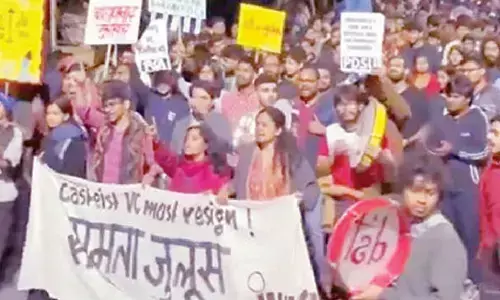Talking of cleanliness to empty stomachs

There was a hilarious joke about Indian Prime Minister Jawaharlal Nehru and Soviet Prime Minister Nikita Khruschev. Once Khruschev visited India and during his drive to the hotel room from the airport, he was surprised, rather amused,
There was a hilarious joke about Indian Prime Minister Jawaharlal Nehru and Soviet Prime Minister Nikita Khruschev. Once Khruschev visited India and during his drive to the hotel room from the airport, he was surprised, rather amused, when he saw people defecating in the open. He asked about it to Nehru who was totally embarrassed. Some months later Nehru visited Moscow and was looking for someone who was doing the same along the roadside. At last he found one and was too happy to bring it to the notice of Khruschev. The Russian Prime Minister could not believe it. When Nehru insisted that he had indeed spotted one, Khruschev replied, “Then he must be an Indian!”

Lalu Prasad Yadav, a buffoon himself, was the Railway Minister for a long time. When he was confronted by opposition members in Parliament about lack of cleanliness in railways, he retorted. “ I’m disgusted by the way passengers use the toilets when the train is stationary at the platform. After the train leaves the entire track appears to be an open toilet stinking and smelling all around…”
The condition in the First Class AC coach is no better. The occupants are supposed to be educated and well-bred and heeled, conscious about sanitation and hygiene. But within a few hours the coach will be littered with all sorts of things, commodes will be blocked by putting rubbish, flushes will be rendered dysfunctional and washbasins put out of use.
If what we see on the train is disgusting, what is happening on the flights is apprehensible. Passengers generally board the flight after a long wait at the waiting lounges where clean toilets are provided. But, on boarding the flight, quite often, there is a mad rush to the toilet, even blocking the passage for the people to occupy their seats. At least can’t they wait for the flight to take off so that other passengers will not be inconvenienced?
The general lack of cleanliness and hygiene hit the eye wherever one goes – hotels, hospitals, workplaces, railway stations and bus stations, airports and even temples. Indians think nothing of spitting and urinating whenever they like and wherever they choose. Spitting in buses by pan-chewers is a regular sight. The passengers sitting behind are made to suffer with the red saliva splashing on their faces and dress.
Charity, they say, begins at home. Even sanitation and hygiene are also learnt at home first. But how many families can boast of having a clean kitchen and toilet and hygienic surroundings? Some people conscious about their clean premises throw all the rubbishes to the neighbour’s property or on to the roads. This rubbish or the banned plastic bag, which they have disposed of, may be the reason for the choked drainage outside their homes. And, all that is needed is to take a stick and give a push to the blocked substance. They will bear the stink for any number of days, but will not do it. They want the Municipal staff to come and do it for them.
In urban centres we see families living on the footpaths and other vacant plots. They cook there, bathe there, defecate there, sleep there, breed and multiply there. While the women and children beg, the men may be doing some odd jobs or engaged in criminal activities. Most parts of the city roads are occupied by such unworthy elements. The rest will be occupied by roadside vendors, fast food kiosks who dirty the roads by cooking and washing the plates. This business goes on unchecked by the municipal staff who fill their pockets with haftas, get free foods to eat and even take a parcel home. Then how do we expect our city roads to be kept clean and safe for motorists and pedestrians alike.
Our politicians want our cities to be like Singapore. First, in Singapore they don’t have such families living on the footpaths. Second, in the night some restaurants occupy the footpaths until the wee hours. But they wash the footpaths before they close the shop. Third, we see discipline on the roads and whatever they do. Our pan-chewing politicians must discipline themselves first before they embark on the Singaporean model.
Cleanliness is next to godliness, our seers, especially Gandhiji, had taught us. To fulfil Gandhiji’s dream Prime Minister Narendra Modi has launched the Swachh Bharat Abhiyaan on October 2, taking a broom in his own hands and sweeping some Dalit locality in the national capital. Modi wants every home and school to have access to a toilet by 2019, in time for the 150th birth anniversary of Mahatma Gandhi. The event went viral and every leader worth his name wielded a broom in his hand. Those who missed the occasion, like Sachin Tendulkar and Anil Ambani, have staged similar sweeping actions on subsequent days, accompanied by dozens of cameramen. That was news for TV channels and national dailies.
Jokes apart, the issue needs serious consideration. India’s fast-growing towns and cities are littered with rubbish. Most rivers and lakes are polluted with sewage and industrial pollutants. Only less than 25 per cent of Indians have access to sanitation. The United Nations said in May that half of India’s people defecate outside, putting the poor people at the risk of cholera, diarrhoea, dysentery, hepatitis A and typhoid. We are emerging as the second most developed country in Asia and one among the 10 most developed in the world, but more than half of our people are still living in conditions two or three centuries behind. We may go to Moon and even Mars, but if Modi cannot provide the bare minimum necessities to the poor, he may have to face the same embarrassment what Nehru had experienced some 50 years ago. Cleanliness cannot be imposed through education, compulsion or one-time campaign. It requires a change of habit or attitude for the rich and economic emancipation for the poor.




